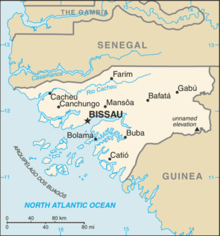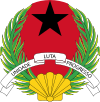1980 Guinea-Bissau coup d'état
| 1980 Guinea-Bissau coup d'état | |||||||
|---|---|---|---|---|---|---|---|
 Map of Guinea-Bissau. | |||||||
| |||||||
| Belligerents | |||||||
| Commanders and leaders | |||||||
| Luís Cabral | João Bernardo Vieira | ||||||
| Casualties and losses | |||||||
| No casualties reported. | |||||||
Nexus of coup in Bissau (marked green), Guinea-Bissau | |||||||
The 1980 Guinea-Bissau coup d'état was the bloodless military coup that took place in Guinea-Bissau on 14 November 1980, led by Prime Minister General João Bernardo Vieira.[1] It led to the deposition of President Luís Cabral (half-brother of anti-colonial leader Amílcar Cabral), who held the office since 1973, while the country's War of Independence was still ongoing.
Aftermath
[edit]General Vieira announced the creation of the Revolutionary Council, which would exercise all executive and legislative powers in the country. Eventually, a power struggle developed[2] between Vieira and Victor Saúde Maria, Prime Minister and Vice President of the Revolutionary Council, the only civilian member of the body, with the latter being forced into exile in Portugal in March 1984. Two months later a new Constitution was promulgated, proclaiming Vieira as President and returning the country to civilian rule.
Vieira himself was deposed in the 1998–99 Civil War and exiled to Portugal in June 1999,[3][4][5] but returned to the country in 2005[6] and was again elected to the presidency,[7] and held the office until his assassination by a group of soldiers on 2 March 2009.[8][9][10]
Effects on relations with Cape Verde
[edit]
The coup resulted in the abandonment of the proposed unification of Guinea-Bissau with Cape Verde, a fellow Lusophone West African country. Prior to the coup, the unification was written into the two countries' constitutions,[11] and the PAIGC party (the ruling sole legal party in both countries) viewed them as "sister republics" with "two bodies with only one heart", and the countries had nearly identical flags and shared a national anthem.[12]
However, the elites in Cape Verde opposed unification,[12] and eventually Vieira toppled the government of President Cabral (himself of the Cape Verdean origin) in Guinea-Bissau in a bloodless coup, which initial reports[13] credited to racial strife between the black population of Guinea-Bissau and the "foreign" mulatto (mestiço) population of Cape Verde, which Cabral embodied.
The coup led to Cape Verde separating on 20 January 1981.[12][11] The Cape Verdean branch of the PAIGC party broke away and formed the new PAICV party under the leadership of Aristides Pereira, President of Cape Verde and former Secretary-General of the PAIGC.[14]
-
Flag of Cape Verde, in use until 1992.
See also
[edit]References
[edit]- ^ "1980 Coup in Guinea Bissau". roape.org. Archived from the original on 2018-10-29. Retrieved 2018-10-29.
- ^ "AROUND THE WORLD; Army Ousts Last Civilian In Guinea Bissau Regime". The New York Times. 15 March 1984. Retrieved 29 October 2018.
- ^ "Loyalist troops capitulate" Archived 2008-03-19 at the Wayback Machine, IRIN, 7 May 1999.
- ^ "Guinea-Bissau palace ablaze", BBC News, 7 May 1999.
- ^ "Deposed Guinea-Bissau's president arrives in Portugal", BBC News, 11 June 1999.
- ^ "Nino Vieira returns from exile to a hero's welcome", IRIN, 7 April 2005.
- ^ "Army man wins G Bissau election", BBC News, 28 July 2005.
- ^ "Guinea-Bissau president shot dead ", BBC, 2 March 2009.
- ^ "Guinea-Bissau president 'killed in clash between rival soldiers'", The Guardian, 2 March 2009.
- ^ "President Joao Bernardo Vieira of Guinea-Bissau assassinated by army", Times Online, 2 March 2009.
- ^ a b MacQueen, Norrie (February 1, 2006). "Widening trajectories: Guinea Bissau and Cape Verde since independence". Relações Internacionais. Archived from the original on April 23, 2015. Retrieved October 29, 2015.
- ^ a b c Mendy, Peter Karibe; Lobban, Jr., Richard A. (October 17, 2013). "Cape Verde, Relations with". Historical Dictionary of the Republic of Guinea-Bissau. Scarecrow Press. ISBN 9780810880276. Retrieved October 29, 2015.
- ^ "Bloodless Coup in Guinea-Bissau". The Sunday People [Monrovia, Liberia] 1980-11-16: 1/8.
- ^ Political Parties of the World (6th edition, 2005), ed. Bogdan Szajkowski, page 113.




